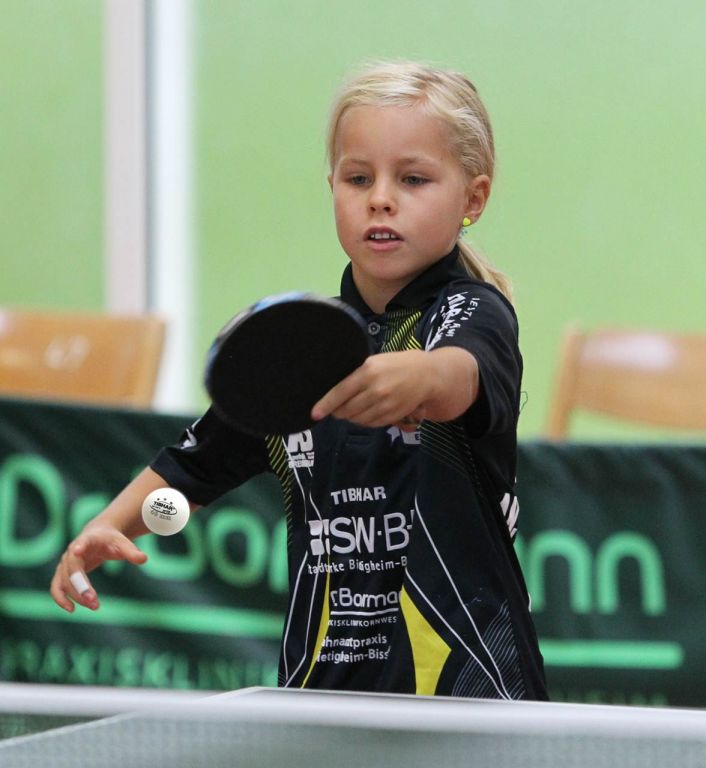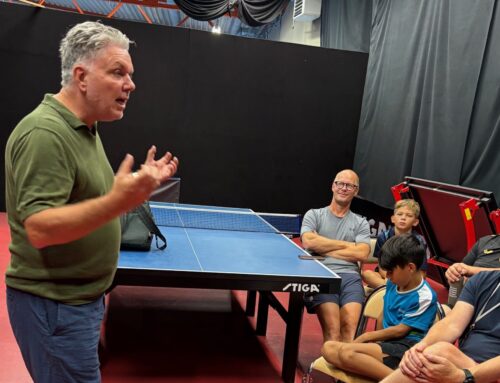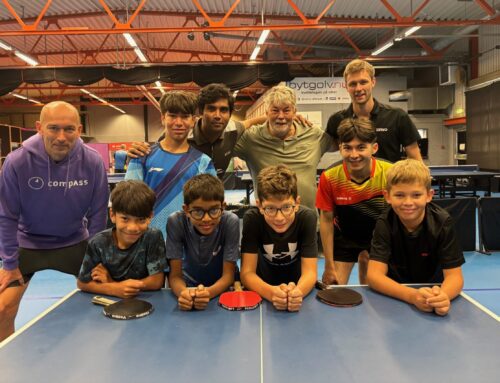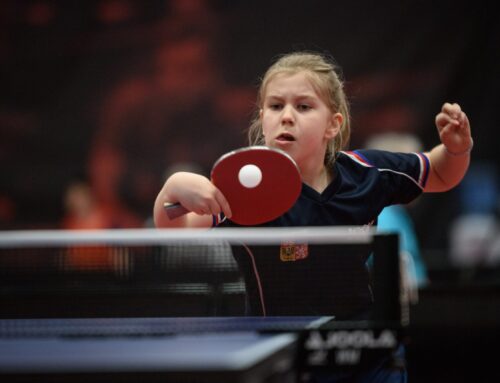Jochen Leiss: Nice performance at the end
compass’s former managing director Jochen Leiss reflects on his mission to develop European talents and shares his challenges and goals with the impact made on the table tennis world.

none
Eskilstuna 2018. Jochen Leiss, right, talking to compass expert coach Oliver Alke in Sweden. Photo: Jens Fellke
“It has been a very interesting five years, and I feel privileged to have met and worked with so many competent and caring people. But I won’t miss waking up every morning and thinking about the many calls I have to make during the day, the emails I have to send, and the seemingly endless administrative tasks that have to be done.”
Leaving Germany’s table tennis landscape with its 700,000 players for Norway with its 1,000 table tennis players was a radical move by Jochen Leiss in the mid-1980s. Almost as big was the step to leave the extremely successful “Norwegian Top Sports Gymnasium” (NTG) for compass and return to the table tennis world in 2016.
“Somehow it was the right time to leave Norway. When I left, I had worked out and implemented a concept together with colleagues that raised the quality of the school so much and the interest in the country for NTG was so extreme that there are now 10 NTG schools spread all over the long country. I felt that I had done a great job and made my contribution.”
So, from now on Jochen Leiss is a pensioner. When he wakes up, the only calls he must make will be to friends him and his partner Claude Bergeret wish to meet at the tennis club they joined in Malaga, where they intend to live most of the time. The only emails he needs to send will be inquiring whether they should play frisbee golf or padel tennis, or rather just stroll in the old town along the seafront. His only administrative tasks will be organising a trip to a beautiful place along the Costa del Sol.
After completing tasks as harrowing as these, the rest of the year will be spent in Paris to relax. There, they can visit museums and exhibitions, attend musicals and sporting events, or even go on a bike tour, with a stopover for lunch at a cozy restaurant.
Still part of the action
Despite this well-earned retirement in near paradise conditions, Jochen Leiss has not completely said goodbye to table tennis. In keeping with the dedication he has always shown compass, he will continue as a board member of the foundation, where he will still monitor what’s happening in the table tennis world, especially with young talents up to age 15. He will be a worthy sparring partner on how to achieve compass’s lofty goals – “to create and establish a sustainable system in European table tennis for training global TOP10 players to keep Europe competitive and challenge the established domination enjoyed by China currently.”
“Developing a talent into a world-class player is always a question of doing the right things at the right time with the right people,” he says in our Zoom interview. “Starting to play early is crucial because the development of the synapses in the brain that control motor skills is strongest in early childhood.”
Hanover 2017. Mario Amizic instructs a kindergarten group. Photos: Jens Fellke
However, it’s not enough to just play in tournaments and competitions, according to Leiss and compass: to drive the right developmental momentum, the child needs to play more or less every day and have the opportunity to repeat the strokes as often as possible.
Too many players for one coach
“When two beginners play together, there is little contact with the ball, more enjoying chasing it all over the gym rather than actually hitting it. Therefore, the coach should focus on one talent at a time and give a lot of one-on-one training. Herein lies the second major challenge after a good screening: club and state coaches are instructed to divide their time and attention evenly among 12-14 players, regardless of the varying levels of talent and enjoyment of the game among the children. They do not have the luxury of taking care of individual motivated and talented beginners.”

none
Münster/Hesse 2017. Visiting Horst Heckwolf's project in a kindergarten.
An interesting and promising project that compass supported in the early days of the now five years old foundation was to visit kindergartens, introduce table tennis in the children’s daily environment and then offer them the chance to play regularly in a local club. Many of the kindergarten children did that, as much as 30% of them taking advantage of the opportunity.
Unfortunately, a big problem was still prevalent: when the fascination and interest for table tennis was awakened in the children, the resources and commitment in the clubs were not enough to really keep the momentum rolling. Children either stopped playing in the club or just developed at an albeit normal pace, but one slower than compass envisions.
“That’s why most successful junior players, both in Europe and Asia, have come from table tennis families where either the mother or father, and often an older sibling, did a lot of individual training with the younger child. In China for example, beginner training with one adult and 2-3 children has been the norm for a long time.”
Creating a system
The long-term goal of compass is to create a system based on this simple insight. The level of the best Europeans and the development of table tennis on the continent should not depend on the coincidental passionate commitment of former players to their child’s table tennis success.
“We conduct our own screening and check if the crucial conditions are met. When we add a player to the compass team, our full-time coaches Oliver Alke and Evelyn Simon work closely with the player’s personal coach at home, both to educate and follow the process, and to make sure the development is in line with our goals.”

none
Tokyo 2019. Annett Kaufmann and her compass expert coach Evelyn Simon in Japan. Photo: private
In addition, compass also provides financial support for the many expenses involved in becoming a top player. This can involve scholarships or direct support for additional training and competing. Travel to international youth championships or to attend training courses is also supported. Furthermore, there is support for talents to get an outfitter contract.
Jochen Leiss is a 116-time national player and former German champion. Leiss was national youth coach and competition sports coordinator in the DTTB. In 1986 he moved to Norway and worked for seven years as general secretary and national coach in the Norwegian Table Tennis Federation. After that he worked as head of sports and sports director of the aforementioned foundation ‘Norwegian Top Sports Gymnasium’ (NTG), from which several Olympic and world champions in 25 different sports have emerged, until 2016.
The impact of compass on European table tennis
So how has five years of compass influenced or changed the world of European table tennis? “It’s always difficult to say whether people have changed their thinking on how to help young kids become top players. We have shared the scientific facts and how the most successful players became top players with many people and organisations in Germany and other countries. I think everyone agreed with the facts we presented, many thought about it and a few even took the initiative.
So something has happened, even beyond the work of our trainers. Starting to play early seems to be more accepted and club or national coaches’ focus on individual players has shown that it is possible to accelerate development. Examples are Evelyn Simon with Annett Kaufmann in Baden-Würtemberg, Olli Alke with Lleyton Ullman in Hamburg, Mirsad Fazlic with Luke Jalaß in Schleswig-Holstein or Christine Mettner in WTTV.
We have also had many talks and discussions with the DTTB over the years. There, too, our thoughts are in fertile ground, even if the top association cannot work with the youngest because its tasks start later. However, in my opinion, many other things have improved for various reasons at the DTTB.
For example, the strict division into age groups in the junior squads has been dissolved. Today, the talents are promoted according to their performance level, which means that playing strength, not age, is decisive for participation in team training.
One example is Annett Kaufmann, who is still allowed to train with the women’s national team as a high school student. This gives the talents important impulses, and subsequently a better national team for the DTTB. This fits with ‘you become as good as or better than those you mix with’, and is something we have always acted on in Norway and which is co-decisive for the development of a young athlete,” says Jochen Leiss.
Many talents and coaches in the team
In the beginning, the idea of the first compass coach, Mario Amizic, was to work very concentrated with few talents. That has changed. Today, compass works with many talents of different ages and origins. Fifteen of them are German, one is French and four are Swedish. The youngest, Eduard Kardon from Schleswig-Holstein, was born in 2014. Time will tell who develops accordingly to be promoted even at the age of 12 or 15.
Annett Kaufmann – at the beginning and as U21 European champion. Photos: private & ETTU
“The biggest success for a compass player came last weekend when Annett Kaufmann was crowned the youngest ever U21 European singles champion. She is a perfect example of how compass should and can work.
But Annett could never have done it without the support of those around her. Without her mother, who drove her and her sister Alexandra to training almost every day; Evelyn Simon, first her base coach, then part-time state/compass coach, now full-time compass coach, who dealt intensively with the admittedly sometimes headstrong girl in the hall and outside; without the TTBW with Sönke Geil and his people; the DTTB with its measures; and us, from compass, it would not have been possible for Annett to get this far. All have contributed their part, but most of all, of course, Annett herself!
I congratulate her on this success and say: what you have achieved today and made you a winner will not be enough tomorrow. Let’s go, the future awaits.”
Jochen Leiss: Nice performance at the end
Jochen Leiss: Nice performance at the end
compass’s former managing director Jochen Leiss reflects on his mission to develop European talents and shares his challenges and goals with the impact made on the table tennis world.

none
Eskilstuna 2018. Jochen Leiss, right, talking to compass expert coach Oliver Alke in Sweden. Photo: Jens Fellke
“It has been a very interesting five years, and I feel privileged to have met and worked with so many competent and caring people. But I won’t miss waking up every morning and thinking about the many calls I have to make during the day, the emails I have to send, and the seemingly endless administrative tasks that have to be done.”
Leaving Germany’s table tennis landscape with its 700,000 players for Norway with its 1,000 table tennis players was a radical move by Jochen Leiss in the mid-1980s. Almost as big was the step to leave the extremely successful “Norwegian Top Sports Gymnasium” (NTG) for compass and return to the table tennis world in 2016.
“Somehow it was the right time to leave Norway. When I left, I had worked out and implemented a concept together with colleagues that raised the quality of the school so much and the interest in the country for NTG was so extreme that there are now 10 NTG schools spread all over the long country. I felt that I had done a great job and made my contribution.”
So, from now on Jochen Leiss is a pensioner. When he wakes up, the only calls he must make will be to friends him and his partner Claude Bergeret wish to meet at the tennis club they joined in Malaga, where they intend to live most of the time. The only emails he needs to send will be inquiring whether they should play frisbee golf or padel tennis, or rather just stroll in the old town along the seafront. His only administrative tasks will be organising a trip to a beautiful place along the Costa del Sol.
After completing tasks as harrowing as these, the rest of the year will be spent in Paris to relax. There, they can visit museums and exhibitions, attend musicals and sporting events, or even go on a bike tour, with a stopover for lunch at a cozy restaurant.
Still part of the action
Despite this well-earned retirement in near paradise conditions, Jochen Leiss has not completely said goodbye to table tennis. In keeping with the dedication he has always shown compass, he will continue as a board member of the foundation, where he will still monitor what’s happening in the table tennis world, especially with young talents up to age 15. He will be a worthy sparring partner on how to achieve compass’s lofty goals – “to create and establish a sustainable system in European table tennis for training global TOP10 players to keep Europe competitive and challenge the established domination enjoyed by China currently.”
“Developing a talent into a world-class player is always a question of doing the right things at the right time with the right people,” he says in our Zoom interview. “Starting to play early is crucial because the development of the synapses in the brain that control motor skills is strongest in early childhood.”
Hanover 2017. Mario Amizic instructs a kindergarten group. Photos: Jens Fellke
However, it’s not enough to just play in tournaments and competitions, according to Leiss and compass: to drive the right developmental momentum, the child needs to play more or less every day and have the opportunity to repeat the strokes as often as possible.
Too many players for one coach
“When two beginners play together, there is little contact with the ball, more enjoying chasing it all over the gym rather than actually hitting it. Therefore, the coach should focus on one talent at a time and give a lot of one-on-one training. Herein lies the second major challenge after a good screening: club and state coaches are instructed to divide their time and attention evenly among 12-14 players, regardless of the varying levels of talent and enjoyment of the game among the children. They do not have the luxury of taking care of individual motivated and talented beginners.”

none
Münster/Hesse 2017. Visiting Horst Heckwolf's project in a kindergarten.
An interesting and promising project that compass supported in the early days of the now five years old foundation was to visit kindergartens, introduce table tennis in the children’s daily environment and then offer them the chance to play regularly in a local club. Many of the kindergarten children did that, as much as 30% of them taking advantage of the opportunity.
Unfortunately, a big problem was still prevalent: when the fascination and interest for table tennis was awakened in the children, the resources and commitment in the clubs were not enough to really keep the momentum rolling. Children either stopped playing in the club or just developed at an albeit normal pace, but one slower than compass envisions.
“That’s why most successful junior players, both in Europe and Asia, have come from table tennis families where either the mother or father, and often an older sibling, did a lot of individual training with the younger child. In China for example, beginner training with one adult and 2-3 children has been the norm for a long time.”
Creating a system
The long-term goal of compass is to create a system based on this simple insight. The level of the best Europeans and the development of table tennis on the continent should not depend on the coincidental passionate commitment of former players to their child’s table tennis success.
“We conduct our own screening and check if the crucial conditions are met. When we add a player to the compass team, our full-time coaches Oliver Alke and Evelyn Simon work closely with the player’s personal coach at home, both to educate and follow the process, and to make sure the development is in line with our goals.”

none
Tokyo 2019. Annett Kaufmann and her compass expert coach Evelyn Simon in Japan. Photo: private
In addition, compass also provides financial support for the many expenses involved in becoming a top player. This can involve scholarships or direct support for additional training and competing. Travel to international youth championships or to attend training courses is also supported. Furthermore, there is support for talents to get an outfitter contract.
Jochen Leiss is a 116-time national player and former German champion. Leiss was national youth coach and competition sports coordinator in the DTTB. In 1986 he moved to Norway and worked for seven years as general secretary and national coach in the Norwegian Table Tennis Federation. After that he worked as head of sports and sports director of the aforementioned foundation ‘Norwegian Top Sports Gymnasium’ (NTG), from which several Olympic and world champions in 25 different sports have emerged, until 2016.
The impact of compass on European table tennis
So how has five years of compass influenced or changed the world of European table tennis? “It’s always difficult to say whether people have changed their thinking on how to help young kids become top players. We have shared the scientific facts and how the most successful players became top players with many people and organisations in Germany and other countries. I think everyone agreed with the facts we presented, many thought about it and a few even took the initiative.
So something has happened, even beyond the work of our trainers. Starting to play early seems to be more accepted and club or national coaches’ focus on individual players has shown that it is possible to accelerate development. Examples are Evelyn Simon with Annett Kaufmann in Baden-Würtemberg, Olli Alke with Lleyton Ullman in Hamburg, Mirsad Fazlic with Luke Jalaß in Schleswig-Holstein or Christine Mettner in WTTV.
We have also had many talks and discussions with the DTTB over the years. There, too, our thoughts are in fertile ground, even if the top association cannot work with the youngest because its tasks start later. However, in my opinion, many other things have improved for various reasons at the DTTB.
For example, the strict division into age groups in the junior squads has been dissolved. Today, the talents are promoted according to their performance level, which means that playing strength, not age, is decisive for participation in team training.
One example is Annett Kaufmann, who is still allowed to train with the women’s national team as a high school student. This gives the talents important impulses, and subsequently a better national team for the DTTB. This fits with ‘you become as good as or better than those you mix with’, and is something we have always acted on in Norway and which is co-decisive for the development of a young athlete,” says Jochen Leiss.
Many talents and coaches in the team
In the beginning, the idea of the first compass coach, Mario Amizic, was to work very concentrated with few talents. That has changed. Today, compass works with many talents of different ages and origins. Fifteen of them are German, one is French and four are Swedish. The youngest, Eduard Kardon from Schleswig-Holstein, was born in 2014. Time will tell who develops accordingly to be promoted even at the age of 12 or 15.
Annett Kaufmann – at the beginning and as U21 European champion. Photos: private & ETTU
“The biggest success for a compass player came last weekend when Annett Kaufmann was crowned the youngest ever U21 European singles champion. She is a perfect example of how compass should and can work.
But Annett could never have done it without the support of those around her. Without her mother, who drove her and her sister Alexandra to training almost every day; Evelyn Simon, first her base coach, then part-time state/compass coach, now full-time compass coach, who dealt intensively with the admittedly sometimes headstrong girl in the hall and outside; without the TTBW with Sönke Geil and his people; the DTTB with its measures; and us, from compass, it would not have been possible for Annett to get this far. All have contributed their part, but most of all, of course, Annett herself!
I congratulate her on this success and say: what you have achieved today and made you a winner will not be enough tomorrow. Let’s go, the future awaits.”










